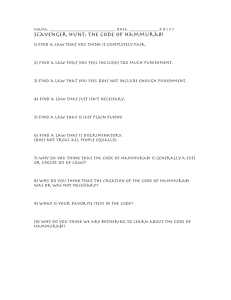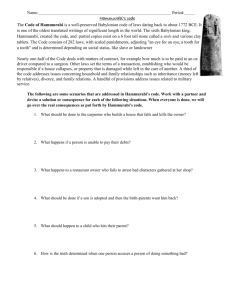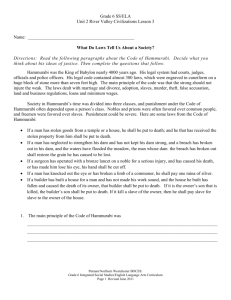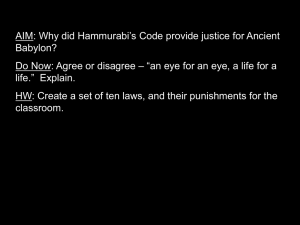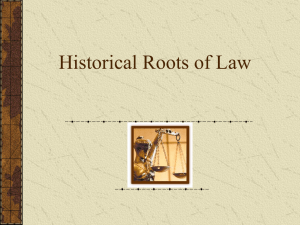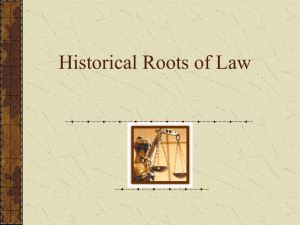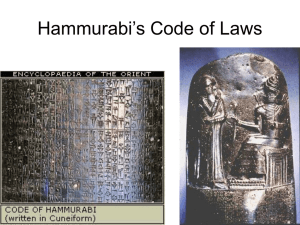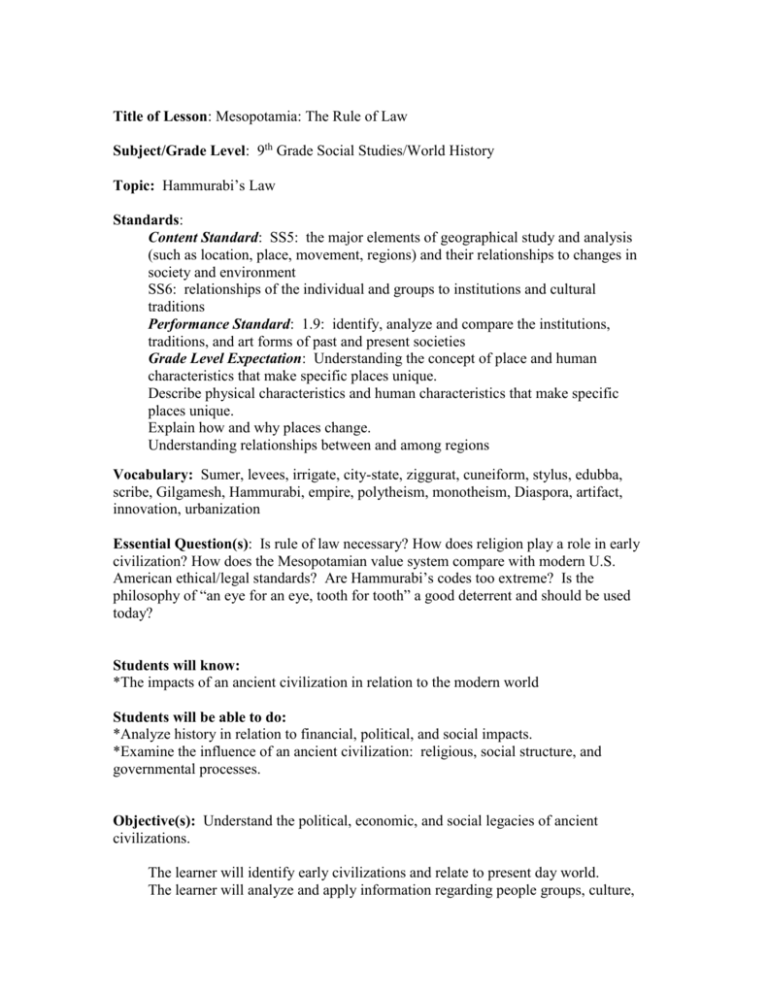
Title of Lesson: Mesopotamia: The Rule of Law
Subject/Grade Level: 9th Grade Social Studies/World History
Topic: Hammurabi’s Law
Standards:
Content Standard: SS5: the major elements of geographical study and analysis
(such as location, place, movement, regions) and their relationships to changes in
society and environment
SS6: relationships of the individual and groups to institutions and cultural
traditions
Performance Standard: 1.9: identify, analyze and compare the institutions,
traditions, and art forms of past and present societies
Grade Level Expectation: Understanding the concept of place and human
characteristics that make specific places unique.
Describe physical characteristics and human characteristics that make specific
places unique.
Explain how and why places change.
Understanding relationships between and among regions
Vocabulary: Sumer, levees, irrigate, city-state, ziggurat, cuneiform, stylus, edubba,
scribe, Gilgamesh, Hammurabi, empire, polytheism, monotheism, Diaspora, artifact,
innovation, urbanization
Essential Question(s): Is rule of law necessary? How does religion play a role in early
civilization? How does the Mesopotamian value system compare with modern U.S.
American ethical/legal standards? Are Hammurabi’s codes too extreme? Is the
philosophy of “an eye for an eye, tooth for tooth” a good deterrent and should be used
today?
Students will know:
*The impacts of an ancient civilization in relation to the modern world
Students will be able to do:
*Analyze history in relation to financial, political, and social impacts.
*Examine the influence of an ancient civilization: religious, social structure, and
governmental processes.
Objective(s): Understand the political, economic, and social legacies of ancient
civilizations.
The learner will identify early civilizations and relate to present day world.
The learner will analyze and apply information regarding people groups, culture,
and livelihood in the world.
Setting Up The Lesson (Anticipatory Set): Educators have differing styles of teaching.
Perhaps, you have had a really tough teacher. You find yourself saying, “This teacher is
really unfair!” Rules and regulations drive you crazy!
Ask students to consider what it would be like to live in a world without laws. Briefly
discuss the problems and inequities that would arise, and point out that people have
organized laws or codes of conduct for thousands of years. Briefly review with students
the historical background of the Code of Hammurabi: who Hammurabi was, where he
lived, and when he created his famous Code of Laws. Tell them they will study some of
these laws closely and compare them to laws and codes of conduct we use today.
Learning Activities: Have students interpret Hammurabi’s Laws. Are the laws too
tough? Why do we need rules and regulations? Is government necessary? Are
Hammurabi’s Laws a deterrent? Have students determine appropriate laws of their own
with fair punishment. Is our current system and rule of law appropriate?
Closure Script: Why are laws appropriate for civilizations of the world? Then and now?
Modifications:
For special education students, provide a partially completed graphic organizer. For
students with reading difficulties, have the text audio-recorded so they can listen as they
read or CWC professional.
Assessment(s)/ Performance Task:
Informal assessment: Class discussion and student response
Formal assessment: Students ability in understanding why law is of utmost importance.
Assessment can be made by students’ ability to write and create justified laws and basic
understanding of the importance of the rule of law (student response).
Materials and Resources:
Lecture notes, list of terms
For modification: assisted help in activity Law
Instructional Strategies for Content Area Learning:
There is a collaborative group effort in formulation and performance of skit.
Students will work together in accomplishing a task while reiterating what has been
taught.
Management: The lesson(s) is one 50 minute lesson. Lecture is 20 minutes with power
point. Students shall have ghost notes, activity is 15 minutes, and discussion/reflection
and intro to subsequent lessons is 15 minutes. Students will be paired in twos for activity.
Learner Diversity: The educator shall determine the grouping of students or CWC based
on classroom diversity/needs of individual learners. Activity and notes shall be tailored
towards IEP.
Significant Tasks: Lecture is tailored to individual learners via direct instruction,
students cooperatively learn in think pair share groups, class works as a whole body in
the brainstorming and overall consensus of the concept being taught.
Remediation/Extensions: Have students read and form a skit based on Hammurabi’s
Laws (have 3 props that must be incorporated in the skit). Have students examine
Hammurabi’s 282 sections of law and interpret fairness in essay form. Students may
write an essay explaining the importance of the rule of law.
Reflection/Self-evaluation:
*Examine what went well. Evidence of this would be student engagement,
completion of diagrams, lists of terms with appropriate reasoning, and student
understanding.
*Reflect on what I would do differently for subsequent classes and
subsequent school years. The teacher shall identify and reflect upon what seemed to
work and most importantly what did not, in the overall understanding of the learners.
Name:_________________
Date:_____________
Examining a Law
Choose 5 of Hammurabi's Laws from the A Selection from the Code of Hammurabi
worksheet. Carefully read each law you chose and answer the following questions for each
law:
Who is involved? What are they told to do or not to do? What are the stated
consequences of complying or not complying with the law?
Law 1:
Law 2:
Law 3:
Law 4:
Law 5:
You may download, print and make copies of these pages for use in your classroom, provided that you include the copyright
notice shown below in all such copies. Copyright © 1999 Houghton Mifflin Company. All Rights Reserved.
A Selection from the Code of Hammurabi
If a judge try a case, reach a decision, and present his judgment in
writing; if later error shall appear in his decision, and it be through his own
fault, then he shall pay twelve times the fine set by him in the case, and he
shall be publicly removed from the judge's bench, and never again shall he
sit there to render judgment.
If any one owe a debt for a loan, and a storm prostrates the grain, or the
harvest fail, or the grain does not grow for lack of water; in that year he need
not give his creditor any grain, he washes his debt-tablet in water and pays
no rent for this year.
If any one be too lazy to keep his dam in proper condition, and does not
so keep it; if then the dam break and all the fields be flooded, then shall he in
whose dam the break occurred be sold for money, and the money shall
replace the corn which he has caused to be ruined.
If any one give another silver, gold, or anything else to keep, he shall
show everything to some witness, draw up a contract, and then hand it over
for safe keeping.
If any one place his property with another for safe keeping, and there,
either through thieves or robbers, his property and the property of the other
man be lost, the owner of the house, through whose neglect the loss took
place, shall compensate the owner for all that was given to him in charge.
But the owner of the house shall try to follow up and recover his property,
and take it away from the thief.
If a man wish to put his son out of his house, and declare before the
judge: "I want to put my son out," then the judge shall examine into his
reasons. If the son be guilty of no great fault, for which he can be rightfully
put out, the father shall not put him out.
If a man take a wife, and she be seized by disease, if he then desire to
take a second wife he shall not put away his wife, who has been attacked by
disease, but he shall keep her in the house which he has built and support her
so long as she lives.
If a builder build a house for some one, even though he has not yet
completed it; if then the walls seem toppling, the builder must make the
walls solid from his own means.
If a builder build a house for some one, and does not construct it
properly, and the house which he built fall in and kill its owner, then that
builder shall be put to death.
If a veterinary surgeon perform a serious operation on an ox, and cure it,
the owner shall pay the surgeon one-sixth of a shekel as a fee.
If he perform a serious operation on an ox, and kill it, he shall pay the
owner one-fourth of its value.
You may download, print and make copies of these pages for use in your classroom, provided that you
include the copyright notice shown below in all such copies. Copyright © 1999 Houghton Mifflin
Company. All Rights Reserved.

